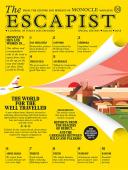
The Escapist
From the editors and bureaux of Monocle magazine, The Escapist: a journal of places less explored.
In This Issue
Oops! No content was found.
Looks like we no longer have content for the page you're on. Perhaps try a search?
Return Home
Daily inbox intelligence from Monocle

From the editors and bureaux of Monocle magazine, The Escapist: a journal of places less explored.
Looks like we no longer have content for the page you're on. Perhaps try a search?
Return Home